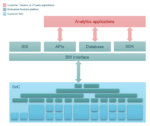The foundry model, multi-source IP blocks, advanced packaging technologies, cloud computing, hyper-connectivity and access to open-source software have all contributed to the incredible electronics products of recent times. Along with this, the complexity of developing and taking a chip to market has also increased. And… Read More
Electronic Design Automation
AMS IC Designers need Full Tool Flows
Digital IC design gets a lot of attention, because all of our modern devices primarily use digital logic, but in reality whenever you have a sensor like a camera, accelerometer, gyroscope or any radio like Bluetooth, WiFi or NFC, then you’re really in the realm of analog, and that’s where mixed-signal IC design comes… Read More
Webinar – Why Keeping Track of IP in the Enterprise Really Matters
Everyone knows IP is an important asset for the enterprise. You spend a lot of money on IP licenses. You try to keep track of who bought what as buying the same thing twice is painful. You wonder if you have the latest version of an IP, especially if it’s part of mission-critical functionality. If you’re a good corporate citizen, you … Read More
Accelerating Exhaustive and Complete Verification of RISC-V Processors
As processor architecture and design development becomes completely liberated with open-source RISC-V instruction set architecture (ISA), the race to get RISC-V silicon in our hands has increased massively. We have no doubt that in next 5 years, we will see RISC-V based laptops and desktops in the market. But would these processors… Read More
Side Channel Analysis at RTL. Innovation in Verification
Roots of trust can’t prevent attacks through side-channels which monitor total power consumption or execution timing. Correcting weakness to such attacks requires pre-silicon vulnerability analysis. Paul Cunningham (GM, Verification at Cadence), Raúl Camposano (Silicon Catalyst, entrepreneur, former Synopsys CTO)… Read More
Using Machine Learning to Improve EDA Tool Flow Results
Back in 2020 I first learned from Synopsys about how they had engineered a better way to do optimize layouts on digital designs by using machine learning techniques, instead of relying upon manual approaches. The product was named DSO.ai, standing for Design Space Optimization, and it produced a more optimal floor-plan in less… Read More
Expanding Intel’s Foundry Partnerships: A Critical Piece of IDM 2.0
One of the career Intel employees (33+ years) that Pat Gelsinger brought back is Stuart Pann. Stuart is now the Senior Vice President of the Intel Corporate Planning Group. He does not have direct foundry experience but he certainly knows Intel and Pat so it will be interesting to see where this goes.
Stuart recently penned an article… Read More
Symmetry Requirements Becoming More Important and Challenging
Humans certainly have always had an aesthetic preference for symmetry. We also see symmetry showing up frequently in nature. The importance of symmetry in electronic designs has been apparent for decades. There are a host of analog structures that require balanced layout. For instance, these include differential pairs and … Read More
Cadence Tempus Update Promises to Transform Timing Signoff User Experience
Cadence invests heavily in the development of their Tempus Timing Signoff Solution due to its importance in the SoC design flow. I recently had a discussion on the topic of the most recent Tempus update with Brandon Bautz, senior product management group director in the Digital & Signoff Group, and Hitendra Divecha, product… Read More
Podcast EP34: IP Management for Early Stage Semiconductor Companies
Dan and Mike are joined by Michael Munsey, senior vice president of marketing, business development and corporate strategy at Perforce. Michael discusses the unique IP management requirements of early stage semiconductor companies and how to address these requirements. The risks associated with a sub-optimal approach are… Read More











AI Bubble?